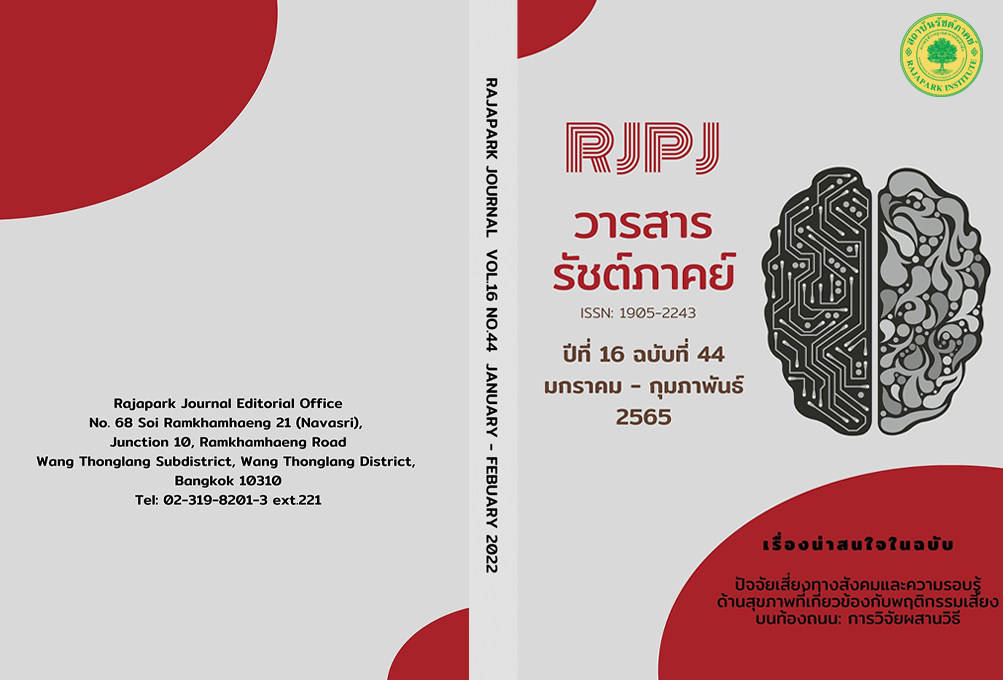The School Administration Model Merging the Professional Learning Community Under Loei Primary Educational Service Area Office 1
Main Article Content
Abstract
The purposes of this research were (1) to study the current condition, desirable conditions, and needs of the school administration model merging the professional learning community under Loei Primary Educational Service Area Office 1, (2) to develop the school administration model merging the professional learning community, and (3) to assess the school administration model merging the professional learning community. Using Mixed-methods Research. The sample groups were 140 Schools administrators and teachers of Schools merging. Research tools were current conditions and desired conditions questionnaire and assessment form of Propriety, Accuracy, feasibility, and Utility. Statistics for Data Analysis were frequency, percentage, mean and standard deviation, and Modified Priority Needs Index. The results were as follows. 1. The overall level of the current condition was at a high level. The overall level of the desirable condition was at the highest level, and the needs of the school administration model merged with the professional learning community. The first ordering was caring community. 2. The school administration model merging the professional learning community consists of 1) the name of the model, 2) the principle and significance, 3) the purpose, 4) the elements of the model, 5) the model to be applied, consisting of 23 operation methods, and 96 activities, or practice methods, 6) success conditions. and 3. The assessment result of the model overall was at a high level.
Article Details

This work is licensed under a Creative Commons Attribution-NonCommercial-NoDerivatives 4.0 International License.
Views and opinions appearing in the Journal it is the responsibility of the author of the article, and does not constitute the view and responsibility of the editorial team.
References
Asawapoom, S. (2007). Using Research and Development of Models in Doctoral Thesis. Teaching Documents for Doctoral Education Seminars. Pp. 50-53: Ubon Ratchathani Rajabhat University.
Aumphrom, S. (2017). Professional Learning Community. Bangkok: Children's Club.
Boonyapo, S. (2012). The Administration Model for Excellence Basic Educational School under the Primary Educational Service Area Office(Doctor of Philosophy, Educational Administration). Silpakorn Univesity.
Chitayawong, S. (2019). Policy and Strategic Plan for Small-Sized Schools Development B.E. 2562-2565 (2019-2022). Video Conferencing, August 17, Retrieved from https://rukkroo.com/20929/
Chookamnerd, W., & Sungtong, E. (2014). Professional Learning Community of in School for Teacher Professional Development Based on Learner Centered Approach. Academic Services Journal Prince of Songkla University, 25(1), 1-10.
Echelkraut, J. P. (2017). Implementing Professional Learning Communities in Small High Schools. United States: Ann Arbor. Edgewood College.
Feger, S., & Arruda, E. (2008). Professional Learning Communities: Key Themes from the Literature. The Education Alliance at Brown University.
Golden, D. (2017). Teacher Perception of Professional Learning Communities on the Instructional Climate At Flintville Elementary School in Lincoln County, Tennessee. United States: Ann Arbor. East Tennessee State University.
Hord, S. M. (1997). Professional Learning Communities: Communities of Continuous Inquiry and Improvement. Austin, Texas: Southwest Educational Development Laboratory.
Krejcie, R. V., & Morgan, D. W. (1970). Determining Sample Size for Research Activities. Educational and Psychological Measurement, 30(3), 607-610.
Leepairat, S., Gesthong, T., & Noichun, N. (2017). The World-Class Standard Elementary School Quality Management Model. Suthiparithat, 31(100), 261-273.
Loei Primary Educational Service Area Office 1. (2021). Small-Sized Schools Management Plan B.E. 2562-2565(2019-2022). Retrieved September 20, 2020, from https://loei1.go.th/
Lumweing, P. (2013). The Small Schools’ Management Model by Office of Basic Education Commission Policy of the School in Loei Primary Educational Service Area Office 2(Doctor of Philosophy, Education Administration). Loei Rajabhat University.
Marquardt, M. J. (1996). Building the Learning Organization: A Systems Approach to Quantum Improvement and Global Success. New York: McGraw-Hill.
Naphrae, K. (2017). Professional Learning Community Affecting the Effectiveness of Academic Administration of Public Primary Schools in Samut Sakhon Province. Muban Chombueng Rajabhat University Research Journal, 5(1) 81-96.
National Reform Steering Assembly. (2019). National Education Reform Steering Council Report Subject: Educational Administration of Small-Sized Schools. The Secretariat of The House of Representatives.
Office of the Basic Education Commission. (2019). Resolution On Schools Incorporate Under The Office of the Basic Education Commission. Bureau of Policy and Planning.
Panich, V. (2011). Ways to Create Learning for Students in the 21st Century. Bangkok: Tathata Publication.
Ruchakom, T. (2018). The Operations of the Professional Learning Community (PLC) of Secondary School Teachers in Samutprakan Province Group 2 under the Secondary Educational Service Area Office 6(Master of Education, Educational Administration). University of Phayao.
Somprach, K. (2016). Learning Leadership of School Principals: A Grounded Theory Study. Khon Kaen. Nanawittaya Publisher.
Thummatasananon, S. (2018). The Development of the Network Group Management Model for Improving Educational Quality in Small-Sized Schools under the Office of Bueng Kan Primary Education Service. Journal of Education, 29(1), 169-182.
Wasi, P. (2013). Teacher’s Learning Community: Transforming “Classroom” Into “Learning Room”. In the Summary Report of the 17th Symposium on Learning Reform for Education for All, on June 4, 2013: The Miracle Hotel Bangkok.
Wongwanich, S. (2007). Needs Assessment Research (2nd ed.). Bangkok: Chulalongkorn University.


